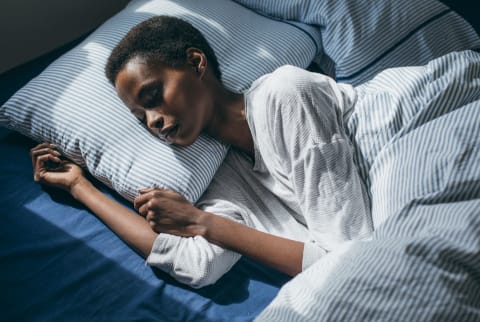As we approach the holidays, it’s crucial that we keep our immune system strong. One of the best ways to do that is by getting the sleep we need. Studies have shown repeatedly that consistent, quality sleep helps bolster our immunity.
“It’s often said that sleep is the best medicine for prevention of illness, and reports have shown an increase in illness in sleep-deprived individuals,” says Sleep Number’s sleep expert and sleep medicine specialist, Peter Polos, M.D. Ph.D.
Quality sleep, he adds, is integral to supporting and strengthening the immune system.
“Our immune system releases small proteins called cytokines, which play a major role when we’re sick or stressed, to protect us,” says Dr. Polos. “The cytokines increase in order to fight infection. And some of these cytokines can help promote sleep.”
This may be why we tend to sleep more when we are ill, Dr. Polos notes — we’re conserving energy so our body can focus on fighting infection. But if we’re sleep-deprived, the production of these important cytokines decreases, which puts us at increased risk of catching a cold as well as infections and chronic health conditions.
In short: consistent, quality sleep is the dependable, science-backed remedy in our medicine cabinet that can make a world of difference to our immunity and overall well-being.
Here are seven simple steps you can take to set yourself up for the restorative rest you need.
Establish a consistent nighttime and morning routine
“It’s important to have the same or similar bedtime and wake times every day — even on weekends,” says Dr. Polos. During the holidays, bedtimes may, understandably, be erratic as we celebrate with loved ones, but get back on track with your routine as soon as you can. By learning about your individual circadian rhythm, you’ll appreciate how a consistent schedule can improve your sleep quality.
Make movement a part of every day
Moving your body during the day sets you up for better sleep at night. And if you can get outside for a short walk in the morning, even better, since exposure to sunlight helps regulate your body clock. Research shows that exercise helps improve the quality and duration of sleep. In the evening, Dr. Polos recommends doing some gentle yoga or stretching.
Wind down every evening
Start by putting away your electronics up to an hour before bedtime. The blue light emitted by our devices suppresses and delays the release of melatonin, the sleep-inducing hormone. Dr. Polos also recommends avoiding caffeine and alcohol before bedtime, as both have been found to interfere with the deep REM sleep your body needs to recharge. Instead, ease your transition to sleep with a relaxing meditation or simple breathing exercise.
Make your bedroom a sleep sanctuary
Dr. Polos recommends keeping your bedroom dark, quiet, and cool — ideally between 67 and 69 degrees. He also suggests using a humidifier, especially “if the environment is dry, such as during winter when the heater is on.” Another idea: make your bed every day and keep your bedroom tidy and distraction-free, so it’s conducive to rest and relaxation.
Get the right bed, because what you sleep on matters
“Make sure you sleep on a comfortable smart mattress that supports you head to toe, and lets you adjust the comfort and firmness on each side of the bed if you sleep with a partner,” says Dr. Polos.
If you’re not feeling well, take time to recover
If you’re feeling sick, don’t just try to “power through.” Make recharging a priority, and if your symptoms persist, make an appointment to see your doctor.
Shift your mindset
If you get sick and are feeling guilty or uncomfortable about taking time away from work, try intentionally shifting your mindset by “reframing” your illness as an opportunity to heal and recharge. Reframing is a powerful tool that allows us to view our experiences in a more positive light. For example, you can remind yourself that taking care of yourself and getting the sleep you need isn’t lazy. On the contrary, it will ensure you can fully recover and show up as your best, most productive, and creative self when you go back to work.
Thrive Global and Sleep Number believe quality sleep has a profound impact on health and well-being. Today, this is more important than ever as we look to quality sleep to help boost immunity, increase energy, and improve recovery. Visit sleepnumber.com to find the best sleep solution for you so you can wake up to your greater purpose.
*Based on SleepIQ® data from 6/9/20 to 8/15/20 of sleepers who viewed the circadian rhythm feature vs. those who did not, with sleep timing capturing bedtime and wake time consistency.**Based on SleepIQ® data from 1/2/20 to 1/1/21 and self-reported responses of sleepers using SleepIQ® technology from 5/12/19 – 1/1/21








